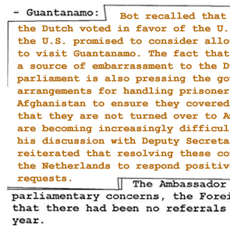Secrecy Without Sense: State Department Censors Cables Already Published by WikiLeaks


The government’s latest response to the WikiLeaks saga reveals its penchant for excessive secrecy in defiance of all reason. Today the ACLU made public eleven documents released by the State Department in response to our Freedom of Information Act (FOIA) request and lawsuit seeking twenty-three embassy cables that had been previously disclosed by WikiLeaks and widely distributed online and in the press.
The cables we requested reveal the diplomatic harms of widely criticized U.S. government policies, including torture, detention and rendition of detainees, detention at Guantanamo, and the use of drones to carry out targeted killings. Although the State Department has stated that the cables released by WikiLeaks are classified government documents, it has consistently refused to confirm the authenticity of any particular cable. But now, for the first time, the government has finally acknowledged that the WikiLeaks release contains authentic State Department cables. The government has released partially redacted versions of eleven cables, and withheld twelve in full.
Frankly, we’re astonished by the government’s response. The cables released by WikiLeaks are available to anyone with an internet connection and a passing interest in U.S. foreign policy. But the government has spent the last year insisting, over and over, that the WikiLeaks cables are still classified, going so far as to forbid certain government employees from accessing them and interrogating a State Department employee who linked to one of the cables from his personal blog. Now, the State Department has reversed course and acknowledged that at least some of the cables can be released to the public without harming national security. That’s what we’ve been saying all along (and, according to reports, what some government officials have been saying too).
The State Department’s response is particularly astounding because it reveals a roadmap of the government’s classification decisions. The information released by the State Department is perhaps more sensitive than the cables themselves, revealing what the government thinks the public should and should not be able to see. The government redacted significant portions of the eleven cables it released to us. But because WikiLeaks has already published the full text of each cable, we know what’s underneath those redactions. On our WikiLeaks Diplomatic Cables FOIA webpage, you can see how the State Department has claimed the authority to conceal information that is embarrassing to or critical of the government, like criticism of the CIA’s black-site prison program and treatment of Guantanamo detainees, while releasing information that paints the U.S. in a positive light. The government also redacted multiple passages containing information that has long been publicly available, such as the fact that Italian prosecutors alleged that a U.S. military jet traversed Swiss airspace on the day the CIA kidnapped cleric Abu Omar from Milan. That’s hardly a secret, since two years ago an Italian court convicted 23 Americans, most of them CIA operatives, of taking part in Abu Omar’s abduction and rendition flight from Italy to Germany and on to Egypt (where he was tortured). At its most harmless, their selectivity reveals a penchant for superficially advancing national image at the cost of transparency. At its worst, it is yet another instance of the government making false claims of secrecy to avoid legal and political accountability.
And then there are the "dirty dozen"—twelve cables that the State Department withheld in full. What is it they don’t want the public to see? Allegations that a former detainee sustained an injury during interrogation at Guantánamo, mention of the tension created between the U.S. and the British and Irish governments over those countries’ disapproval of the U.S. government’s extralegal rendition flights, an account of the Yemeni government’s role in facilitating U.S. airstrikes in Yemen, an explanation of why torture at Abu Ghraib made the United States less secure, and a description of pressure brought by the U.S. government on Germany to prevent Germany from holding the U.S. accountable for kidnapping, torturing, and secretly detaining German citizen Khaled El-Masri. All of these cables describe issues of widespread public concern, so what’s the point of withholding them but not the others?
Even if there was ever reason to think that the disclosure of this publicly available and widely reported information would harm national security, there most certainly is none now. Clearly, any damage to foreign relations or the nation’s image was already sustained when the cables were leaked. In releasing these cables, the State Department went through the charade of redacting already-published text, showing just how committed they are to secrecy for secrecy’s sake. They hide behind a security regime that pretends to be blind and deaf, maintaining that if they say something is secret, people don’t actually know it. This twisted logic defies reason and serves the government’s desire to only be held accountable for information and actions they choose to admit.
Here at the ACLU, we’re awaiting the government’s legal brief justifying its decision to conceal publicly available information from the public, due later this month. We’ll be contesting the government’s withholdings in court, pointing out the absurdity of the government’s broken and inconsistent secrecy regime.



